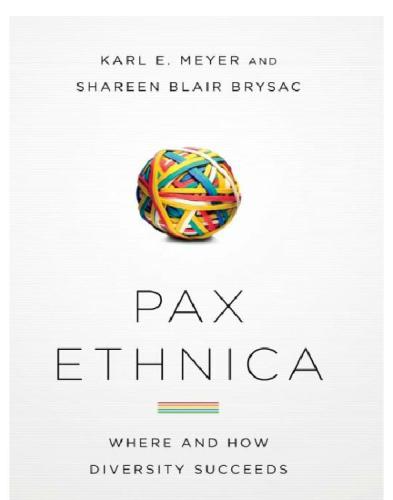
Pax Ethnica
Where and How Diversity Succeeds
فرمت کتاب
ebook
تاریخ انتشار
2012
نویسنده
Shareen Blair Brysacناشر
PublicAffairsشابک
9781610390484
- اطلاعات
- نقد و بررسی
- دیدگاه کاربران
نقد و بررسی

January 23, 2012
From 2009 to 2011, journalist-historians Meyer and Brysac (coauthors of Kingmakers: The Invention of the Modern Middle East) visited five “neglected oases of civility” where ethnic comity prevails: Flensburg, Germany, where peaceful accommodation reigns after centuries of Schleswig-Holstein strife; the Indian state of Kerala, where Hindu, Muslim, and Christian populations not only “flourish peacefully, but…have led the way in literacy, life expectancy, and health care within the world’s most populous democracy”; the Russian Republic of Tatarstan where “comity contrasts with turbulent Chechnya’s unending strife”; multiethnic Marseilles, France, unaffected by the autumn 2005 violence which spread through hundreds of towns; and Queens, New York, “arguably the world’s most diverse political unit, in which 2.3 million people speak 138 languages.” All share pasts of conflict which the authors succinctly review as they interview a wide range of political figures and distinguished citizens: two legislators in Flensburg; a newspaper editor in Tatarstan; a Keralite environmental activist; Marseille’s premier female rapper; and the Borough President of Queens, among others. Treaty or tradition may contribute to ethnic comity, so may location, the happenstance of history, and the passage of time. In the development of “sane oases in a rabid world,” they argue, individuals make it happen, and they offer “11 guidelines for promoting civility in diverse societies”—un-news, but good news.

January 15, 2012
A good-news book, based on serious research, about how traditionally hostile groups can overcome differences to live in harmony. Meyer and Brysac, a married couple, have written previous books together (Kingmakers: The Invention of the Modern Middle East, 2008, etc.) and separately. By examining "neglected oases of civility," they break from the conventional wisdom that ethnic and religious strife are inevitable when perceived enemies share geographic space. These oases include Flensburg, a northern German city emerging from the Schleswig-Holstein region, the longtime border area contested by the warriors of Denmark; the Republic of Tatarstan in the former Soviet Union, where the Muslim majority and the substantial Orthodox Christian minority coexist peacefully; Marseille, France, where a population that is about one-quarter Muslim, an unusually high percentage for a European nation, mingles successfully with sizable Orthodox Christian and Jewish populations; the state of Kerala in India, a densely populated entity bordering the Arabian Sea, where Hindu, Muslim and Christian communities have practiced mutual respect; and Queens, N.Y., where more than 2 million residents speak 138 languages. The authors on-the-ground reporting is impressive, especially given the built-in language barriers. Near the end of the book, Meyer and Brysac share 11 guidelines "promoting civility in diverse societies," which include public grappling by government and private authorities with stereotypes of unpopular minorities; free reign of minority languages within the larger society; constructing housing to integrate diverse populations rather than segregate them; developing public libraries as community centers to overcome language and other cultural differences; empowering women as well as men; and harnessing popular culture to cross societal barriers. A skillful rendering of an inspiring message.
COPYRIGHT(2012) Kirkus Reviews, ALL RIGHTS RESERVED.




دیدگاه کاربران